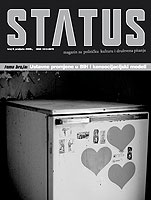Moralne dileme, politički sukobi, tumačenja i promjene (Daytonskog) Ustava – stajalište filozofa jezika
Moral dilemmas, political conflicts, interpretations and changes of the (Dayton) Constitution – a perspective of a philosopher of language
Author(s): Dražen PeharSubject(s): Politics / Political Sciences
Published by: Udruga građana »Dijalog«
Summary/Abstract: The author draws on the concept of ‘moral dilemmas’ as presented, analysed and debated in contemporary moral philosophy; furthermore he explains in what sense, and how, one can elucidate political conflicts, including the conflict in the BiH, on the basis of the concept of ‘moral dilemma.’ The concept manifests three key features: it refers to a situation in which all choices seem to issue in a violation of an ethical principle and thus seem to be equally flawed; secondly, such situations seem to pose a kind of theoretical challenge to our moral intuitions. Thirdly, an ambiguous response represents a common type of response to some typical situations of moral dilemma. In the second part, the author makes a case for a conception of interpretation under which, when valid, interpretation must be founded on a shared fund of political-ethical beliefs; such a conception coincides to a considerable extent with the conception defended by L. Fuller in his ‘The morality of law’. In the third part, the author points to a number of consequences that the first two parts seem to have for our understanding of the Dayton Peace Agreement. He demonstrates that the essence of the Dayton agreement consists in its attempt to confirm in parallel several political principles with a significant moral import, such as the principle of self-determination and the principle of stability and/or equality; he also claims that his analysis explains satisfactorily why some of the most critical provisions of the Dayton agreement were left deliberately ambiguous and open to interpretation. Finally, the author insists on two points: a. there need to be objectively sound and reasonable solutions to moral dilemmas, and such solutions can also be assumed to lead to an acceptable interpretation of ambiguous peace agreements; b. such solutions largely depend on our verbal creativity, i.e. on our ability to offer alternative narratives, discourses, and/or fresh and novel constructions of language. However, one needs to understand that the solution to a moral dilemma, which does not meet the demands of all those ethical-political principles the dilemma is concerned with, is stillborn. The author also suggests strongly that, if the US Constitution managed to live through more than two centuries of the turbulences of American political life, there is no reason why one should not expect that the skeleton of the Dayton Constitution of the BiH remains the essential reference point for political relations within the BiH for a long time.
Journal: STATUS Magazin za političku kulturu i društvena pitanja
- Issue Year: 2006
- Issue No: 09
- Page Range: 127 - 140
- Page Count: 14
- Language: Croatian

